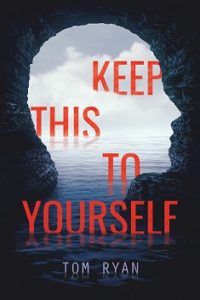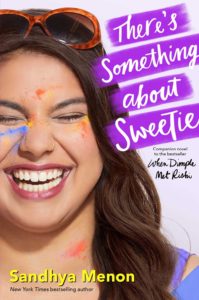Hey YA Readers: I’ve got a special guest newsletter for you today!
“What’s Up in YA?” is sponsored by Albert Whitman & Company, 100 Years of Good Books.
 It’s been a year since the Catalog Killer terrorized the sleepy seaside town of Camera Cove, killing four people before disappearing without a trace. Like everyone else, eighteen-year-old Mac Bell is trying to put that horrible summer behind him—easier said than done since Mac’s best friend Connor was the murderer’s final victim. But when he finds a cryptic message from Connor, he’s drawn back into the search for the killer—who might not have been a random drifter after all. Now nobody—friends, neighbors, or even the sexy stranger with his own connection to the case—is beyond suspicion.
It’s been a year since the Catalog Killer terrorized the sleepy seaside town of Camera Cove, killing four people before disappearing without a trace. Like everyone else, eighteen-year-old Mac Bell is trying to put that horrible summer behind him—easier said than done since Mac’s best friend Connor was the murderer’s final victim. But when he finds a cryptic message from Connor, he’s drawn back into the search for the killer—who might not have been a random drifter after all. Now nobody—friends, neighbors, or even the sexy stranger with his own connection to the case—is beyond suspicion.
 I am generally not a huge romance reader, though I find myself in the mood and enjoying them periodically. This doesn’t extend, though, to romantic comedies — I cannot get enough of them, especially those delightful YA rom coms that have on more than one occasion made me spit out my drink with laughter.
I am generally not a huge romance reader, though I find myself in the mood and enjoying them periodically. This doesn’t extend, though, to romantic comedies — I cannot get enough of them, especially those delightful YA rom coms that have on more than one occasion made me spit out my drink with laughter.
Sandhya Menon is one of the best in the genre, and her latest book There’s Something About Sweetie (out tomorrow, May 14!) hit all of the notes I love about rom coms. There’s great depth to both Sweetie and Ash, as well as a bunch of moments that are equally swoony, cringeworthy, and humorous. I also found myself connecting with Sweetie and her discussion of being a fat girl who enjoys being active on many, many levels — and more, I found the depths to which the book dug into who does and doesn’t get to talk about and judge your body to be powerful.
I’m excited to have Sandhya here to talk today about rom coms. For readers who love the genre, this will encourage more love. For those who haven’t tried it, I suspect this will be the piece that encourages stepping into the world of love and laughs.

I was recently invited to the Emirates Literature Festival in Dubai, my first international book-related trip as a published author. As you might imagine, I boarded the plane with immense excitement, propelling it through dark, cold skies with the sheer force of my exuberance. Gold souks! Sand! Camels! Really, really tall buildings! I was ready for it all. I’m happy to report that both city and event surpassed all my expectations. And my time there was made even more delightful by a panel I was on with writer and research psychologist Ty Tashiro.
Dr. Tashiro happens to be a relationship expert, and, as a romance writer, I listened very closely whenever he spoke (who says writing can’t be evidence-based?). He said many things that opened my eyes (PSA: His book The Science of Happily Ever After is most certainly worth a read if you happen to have relationships of the romantic type with other humans), but one thing in particular stood out to me.
He spoke of the phenomenon of “mood congruence.” Apparently research shows that, with music, people tend to listen to songs that match their mood—for example, upbeat pop when they’re newly in love, depressing indie rock when they’re going through a break up, classical if they’re wearing a tweed jacket with elbow patches while reading Camus (not really, I just made that last part up). But with books, Dr. Tashiro said, the opposite is true.
People turn to books as a source of escapism—to lift them out of whatever emotion they’re feeling. Somewhat contrarily, we tend to read dark books when we’re in a good place emotionally. And lighter genres—like romantic comedies—tend to resonate with people who need to feel hope, who want to believe in the presence of joy. Readers of rom-coms need to believe that no matter how horrible real life currently is, they exist in a universe where true love could arrive on one’s doorstep at any moment and sweep the depressing debris away. They want to feel like life is one giant meet-cute waiting to happen.
And boy, do I identify with that.
 The contract for my first romantic comedy, When Dimple Met Rishi, arrived at a time in my life when I really, really needed to escape into a happy world.
The contract for my first romantic comedy, When Dimple Met Rishi, arrived at a time in my life when I really, really needed to escape into a happy world.
We were gearing up for a presidential election that was going to rock the nation, one way or another, and I was already beginning to see a trickle-down effect in the very red state in which I lived at the time. I remember sitting in my car one evening, trying to leave the mostly empty parking garage at work, only to find that I’d been fenced in by a very large truck plastered with KKK and alt-right stickers. There was nowhere to go, and no one to help. The driver revved his engine, making eye contact in my rearview mirror, blocking me in for a good heart-pounding thirty seconds before tearing off.
Once the shaking in my hands calmed down, I drove home, said hello to my family, walked to my office, and wrote two thousand words in my book. My aggressively happy, everything-is-going-to-be-fine, happily-ever-after-guaranteed book. I could’ve painted a giant middle finger on my car or set my neighbor’s lawn signs on fire, but this felt somehow more well-adjusted.
But I don’t think the need to read (or watch or write) rom-coms comes from such a dramatic place every time. Sometimes, it’s just about fighting against that malaise so many of us have been feeling for a couple of years now—the sense that, no matter how hard we fight or how loud we shout, things refuse to change. Being happy, even for a few hours, feels revolutionary in such conditions. If you’re a woman and/or a marginalized person, snatches of time in which you can forget, in which you can laugh or be entertained or fall in love, feels like treasure you can’t help but hoard.
I’m lucky to have gotten heartwarming emails and letters from readers who’ve read my books during painful breakups, during chemo sessions, during knock-down-drag-out fights with parents who just don’t understand them. They tell me how horrible things have been, all the terrible feelings they’ve been keeping inside them until they were ready to burst. And then, somehow, through providence or luck or a wonderful teacher or librarian or friend, they found my books precisely when they needed to find them. And each time, no matter the circumstance, the message they write to me is the same: “Thank you for helping me forget and for making me laugh.”
So, perhaps the biggest secret behind romantic comedies is this: We consume them to forget where we are, and to remember who we are. As a writer, I cannot think of a more sacred purpose for my books.
Thank you so much, Sandhya, for sharing, and a big thank you to everyone hanging out again this week to talk all things YA books.
We’ll see you again on Thursday!
— Kelly Jensen, @veronikellymars on Instagram and editor of (Don’t) Call Me Crazy and Here We Are.